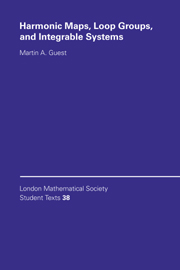Preface
Published online by Cambridge University Press: 05 June 2012
Summary
Motivation: Harmonic maps
The principal motivation for this book was provided by certain recent advances in the theory of harmonic maps, which depend on ideas from the theory of integrable systems.
The concept of harmonic map is a generalization of the concept of geodesic. The harmonic maps in this book go from Riemann surfaces to compact Lie groups or symmetric spaces; they are, therefore, two-dimensional analogues of geodesies. They encompass many fundamental examples in differential geometry, such as minimal surfaces, which have been studied by geometers over a long period of time. Nevertheless, important new discoveries are still being made, and major open problems remain. Since the late 1970s, the field has acquired new vitality from mathematical physics, in the guise of the non-linear sigma model or chiral model. As a result, harmonic maps have attracted the attention of a much wider audience than before, both within the mathematical community and beyond.
One of the themes of research in this area during the last 25 years or so is the “classification” of such harmonic maps, i.e., the description (or parametrization) of harmonic maps from Riemann surfaces to compact Lie groups or symmetric spaces, in terms of well known maps. There are several reasons for doing this. The most obvious one is that such a description provides the “general solution” of the relevant harmonic map equation. Another is that such a description should be useful in describing the “moduli space” (or, more accurately, the parameter space) of solutions of the harmonic map equation.
- Type
- Chapter
- Information
- Harmonic Maps, Loop Groups, and Integrable Systems , pp. vii - xiiiPublisher: Cambridge University PressPrint publication year: 1997



